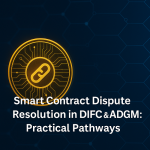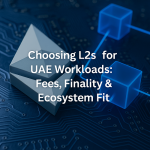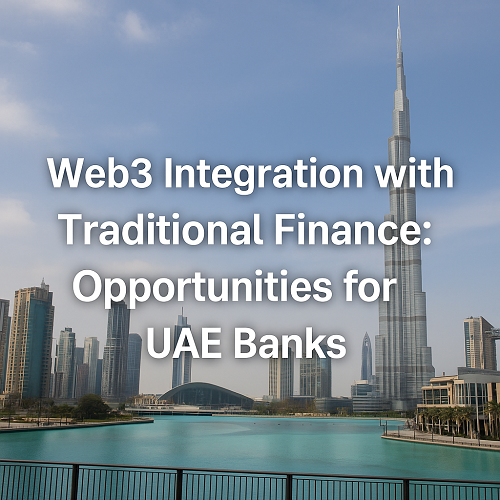Table of Contents
- Introduction
- The Rise of Web3 in Global Finance
- UAE’s Vision for Financial Innovation
- Key Opportunities of Web3 for UAE Banks
- Decentralized Identity (DID) Systems
- Tokenization of Assets
- Smart Contract Automation
- Cross-Border Payments and DeFi
- Enhanced Customer Engagement via dApps
- Government and Regulatory Support in the UAE
- Use Cases and Early Adopters in the UAE Banking Sector
- Challenges to Web3 Adoption in Traditional Finance
- Risk Management and Compliance Considerations
- Future Outlook: Convergence of CeFi and DeFi
- Final Thoughts on Web3 in UAE Traditional Finance
- Frequently Asked Questions (FAQs)
- Let Websima Help You Embrace the Web3 Future
Introduction
As the world accelerates into a decentralized digital economy, the UAE is emerging as a forward-thinking hub where traditional financial institutions are embracing Web3 innovation. This convergence of Web3 in UAE traditional finance is not just a passing trend—it is a foundational shift promising to reshape how banks operate, engage clients, and deliver services.
Web3 technologies—decentralized networks, smart contracts, tokenization, and blockchain protocols—are enabling financial institutions to rethink legacy systems and explore new business models aligned with transparency, efficiency, and user empowerment.
The Rise of Web3 in Global Finance
We’re excited to announce our partnership with @The_HaqqNetwork, a leading force in ethical finance, tapping into a $4T+ global market, to co-develop Sharia-compliant, halal investment solutions built for today’s financial landscape — combining Web3 innovation with TradFi… pic.twitter.com/BwDdCC6OIc
— Welf Finance (@WelfFinance) June 2, 2025
Worldwide, enterprises are increasingly exploring Web3 technologies. A 2023 Deloitte report notes that over 315 global brands launched a total of 526 Web3 projects, signaling strong momentum behind decentralized finance innovation.
Although many banks are investigating Web3 applications, the oft-cited claim that 75% of banks are already investing in it is not supported by Deloitte’s official findings.
For more realistic insight:
- Around 30% of banking organizations have adopted some form of blockchain technology, according to DemandSage.
- The Deloitte Financial Services Predictions 2025 project that by 2030, 25% of large cross-border transactions could settle via tokenized digital currency infrastructure.
This suggests Web3 is becoming foundational—not experimental—in shaping financial services worldwide.
UAE’s Vision for Financial Innovation
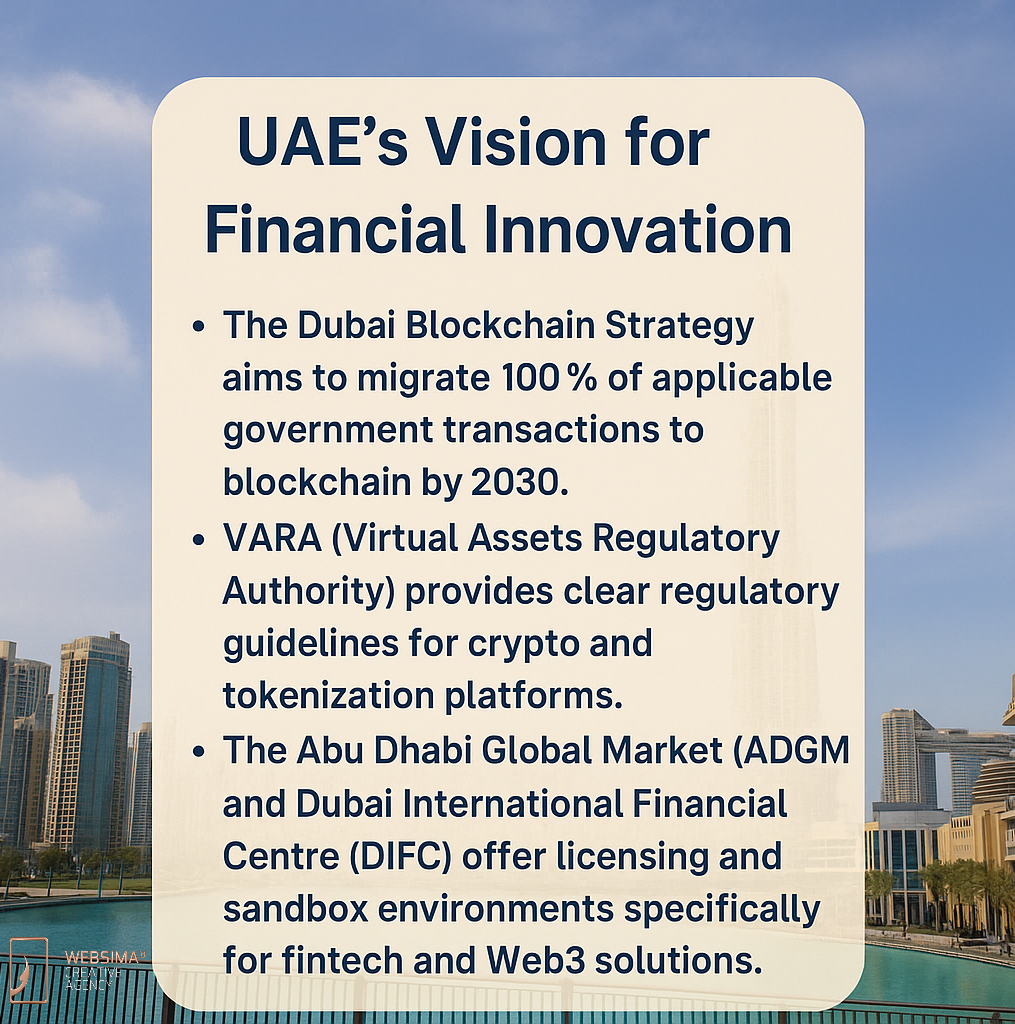
The UAE government has launched several forward-thinking initiatives to support blockchain and Web3 adoption:
- The Dubai Blockchain Strategy aims to migrate 100% of applicable government transactions to blockchain by 2030.
- VARA (Virtual Assets Regulatory Authority) provides clear regulatory guidelines for crypto and tokenization platforms.
- The Abu Dhabi Global Market (ADGM) and Dubai International Financial Centre (DIFC) offer licensing and sandbox environments specifically for fintech and Web3 solutions.
Together, these initiatives create one of the world’s most welcoming ecosystems for banks integrating blockchain and tokenized financial instruments.
Key Opportunities of Web3 for UAE Banks
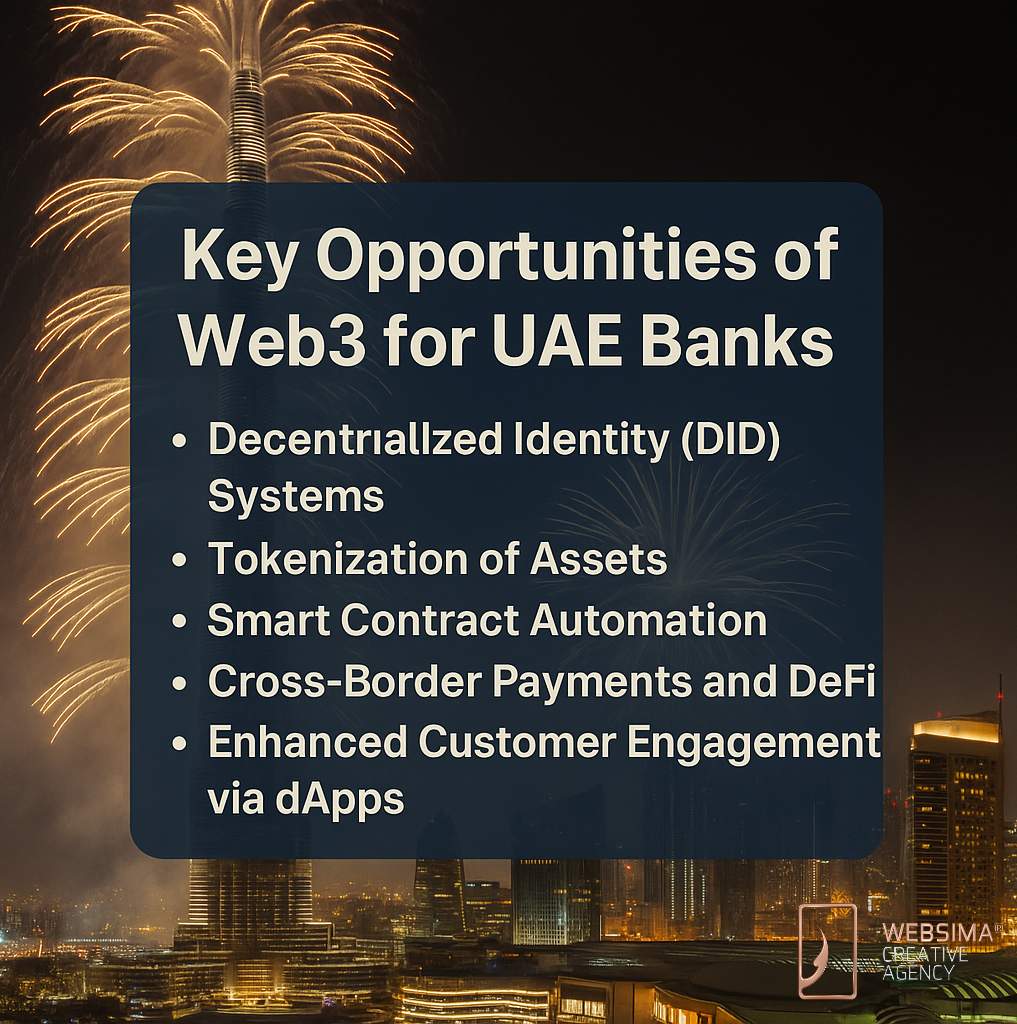
Decentralized Identity (DID) Systems
Decentralized identity frameworks allow banks to streamline KYC processes, reduce duplication, and empower customers to control their own data. This is especially powerful in cross-border financial operations and digital onboarding.
Tokenization of Assets
UAE banks can use tokenization to fractionalize real-world assets—like real estate, commodities, or equity—making them accessible to a broader investor base. Institutions can act as custodians or issuers of tokenized products, expanding revenue channels.
Example: HSBC’s entry into The Sandbox metaverse showcases how traditional banks are exploring tokenized ecosystems.
Smart Contract Automation
Smart contracts allow for real-time automation of lending, trade finance, and insurance contracts, cutting down paperwork, human error, and reconciliation costs. UAE banks can deploy programmable workflows across both retail and commercial banking.
Cross-Border Payments and DeFi
Web3 offers powerful infrastructure for cross-border settlements using stablecoins or CBDCs (central bank digital currencies). The UAE’s involvement in projects like mBridge reinforces this direction.
Enhanced Customer Engagement via dApps
Banks can develop user-facing dApps for peer-to-peer lending, rewards programs, or personal financial management, enabling customers to interact transparently with financial products on-chain.
Government and Regulatory Support in the UAE
The UAE’s unique advantage is its regulatory clarity and proactive licensing. Banks benefit from:
- VARA’s regulatory framework for virtual assets and tokenized services
- ADGM’s DLT Foundation Regulations that allow DAO-like governance in financial ecosystems
- DIFC’s FinTech Hive, a program accelerating blockchain finance innovation
This regulatory infrastructure encourages public-private collaboration in building next-gen banking services.
Use Cases and Early Adopters in the UAE Banking Sector
Several financial institutions in the UAE are already experimenting with Web3:
- Emirates NBD piloted a blockchain-based cheque verification tool to prevent fraud.
- First Abu Dhabi Bank (FAB) joined the mBridge CBDC pilot.
- Dubai Islamic Bank is exploring tokenized sukuks and Islamic DeFi frameworks.
These cases underscore the growing seriousness of Web3 integration in UAE traditional finance.
Challenges to Web3 Adoption in Traditional Finance
Despite the promise, UAE banks face several hurdles:
- Integration issues with legacy banking systems
- Lack of Web3 development talent
- Evolving cybersecurity risks, especially in smart contract exploits
- Public education gaps, which can limit retail adoption
Banks must build strategic partnerships and internal capabilities to overcome these barriers.
Risk Management and Compliance Considerations
To stay compliant, banks must address:
- Anti-Money Laundering (AML) and Counter Financing of Terrorism (CFT) obligations in decentralized networks
- Third-party smart contract audits to prevent code-based attacks
- Custody risks around private key management
- Data residency laws under DIFC and ADGM jurisdictions
Fortunately, regulators like VARA and ADGM provide legal frameworks that support secure innovation.
Future Outlook: Convergence of CeFi and DeFi
Rather than being competitors, centralized and decentralized finance are starting to converge. This convergence will likely produce:
- Hybrid banking models combining bank-grade compliance with Web3 functionality
- Tokenized currencies and synthetic assets traded on institutional-grade platforms
- Decentralized settlement rails layered beneath centralized banking interfaces
The UAE is poised to lead this transformation thanks to its legal flexibility, tech infrastructure, and global financial reach.
Final Thoughts on Web3 in UAE Traditional Finance
Web3 is reshaping global finance—and UAE banks are uniquely positioned to lead the change. With regulatory certainty, innovation zones, and public-private cooperation, the country is laying the foundation for tokenized economies and decentralized financial services.
UAE banks that embrace Web3 now stand to benefit from:
- Faster, cheaper settlement options
- Fractional asset markets
- More secure and personalized customer apps
- Automation of complex financial workflows
The future of banking in the UAE will not just be digital—it will be decentralized, tokenized, and borderless.
Frequently Asked Questions (FAQs)
What is Web3 and why is it important for UAE banks?
Web3 refers to a decentralized internet layer powered by blockchain, smart contracts, and tokenized networks. For UAE banks, it enables secure, efficient, and programmable financial services that go beyond legacy infrastructure.
Are UAE banks allowed to use Web3 or blockchain?
Yes. The UAE has one of the world’s most advanced legal frameworks for virtual assets, with regulatory authorities like VARA, ADGM, and DIFC actively supporting Web3 integration.
What is asset tokenization in banking?
It involves converting real-world assets—like real estate or bonds—into digital tokens that can be traded on blockchain platforms. This enhances liquidity, access, and efficiency.
How can banks start integrating Web3?
Start with internal pilots—such as blockchain-based identity verification or payment rails—then scale through partnerships with licensed Web3 providers like Websima.
Let Websima Help You Embrace the Web3 Future
At Websima, we specialize in helping financial institutions in the UAE navigate Web3 transformation—from legal structuring and smart contract programming to tokenization strategies and infrastructure security.
Whether you’re exploring cross-border payments, decentralized lending, or tokenized real estate, our team of blockchain experts and legal engineers will guide your journey from concept to launch.


